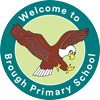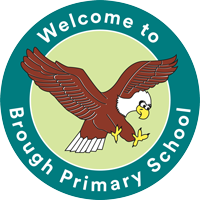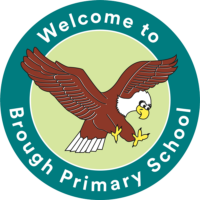Intent
At Brough School, The National Curriculum (2014) provides the framework for all English teaching to secure the delivery of an age-related curriculum with in-built progression for all learners. Teachers use a range of pedagogies to meet the needs of the children and to ensure links between reading and writing are taught explicitly. Curriculum content is planned to make sure that it is appropriate, creates interest and excitement and develops links with other curriculum subjects. It has been developed to recognise the importance of English as a key aspect of everyday life and to grow our children’s love of writing, reading and the confidence and ability to take part in, and contribute to, discussion on a wide range of cross curricular subjects.
Reading
Our aim is to ensure that pupils have opportunities to participate in discussions about books and other multimodal texts, whilst developing the key skills associated with comprehension, exploring the language used and examining the impact their reading has on them. We also ensure that pupils have opportunities to read for research to extend their understanding across the wider curriculum and take pleasure in reading across a range of genres.
Writing
The curriculum at Brough School ensures that pupils are taught to write with clarity and precision, to write for different purposes and audiences using the correct structure and language features, are able to draw upon a wide cross curricular vocabulary and have a sound and accurate understanding of the grammar and spelling rules and terminology needed. It also ensures that pupils are able to express themselves and to convey meaning effectively across a range of curriculum areas. We aim to ensure that pupils enjoy writing and have an enthusiasm for it.
Speaking and Listening
Across the curriculum, we provide opportunities for children to express their opinions and feelings, participate in discussion with different groups of children listening and to respond appropriately, present ideas with confidence, value the views of others and speak confidently to an audience.
At Brough Primary School we want all children to become confident readers, writers and speakers with a wealth of knowledge and skills to foster a love of English in all its forms.
Aims
- The National Curriculum for English aims to ensure that all pupils:
- read easily, fluently and with good understanding
- develop the habit of reading widely and often, for both pleasure and information
- appreciate our rich and varied literary heritage
- write clearly, accurately and coherently, adapting their language and style in and for a range of contexts, purposes and audiences
- acquire a wide vocabulary, an understanding of grammar and knowledge of linguistic conventions for reading, writing and spoken language
- use discussion in order to learn; they should be able to elaborate and clearly explain their understanding and ideas
- are competent in the arts of speaking and listening, making formal presentations, demonstrating to others and participating in debate.
- In addition to the National Curriculum aims we aim to ensure children:
- develop a love of writing to be able to express their thoughts and ideas clearly and creatively through the written word
- re-read, edit and improve their own writing
- confidently use the essential skills of grammar, punctuation and spelling
In order to achieve high standards within English, we implement a curriculum that is progressive from EYFS to Year 6. As well as meeting the requirements of the National Curriculum for English, our provision ensures links are made across the curriculum. English teaching and learning is planned as part of an approach which relates to topics being studied across the wider curriculum and as stand-alone lessons. We provide many deliberate and considered opportunities for reading, writing and discussion using a wide variety of experiences, quality texts and other resources to inspire our children to want to read and write.
Reading
Teachers create a positive reading culture in school, so that it is enjoyed by all pupils. Pupils in EYFS and KS1 have daily phonics sessions, following a systematic synthetic phonics programme. There is a combination of a whole class and carousel guided reading sessions in KS1 and whole class guided reading sessions in KS2 where reading comprehension skills are explicitly taught, practised and consolidated for mastery. Texts are often chosen to increase the children’s knowledge and understanding of the topics being taught in History, Geography and Science.
We use book banded reading books that include fiction, non-fiction and poetry titles to ensure books are at the appropriate level for children so they can develop and practise their reading skills. Children are encouraged to read independently and regularly to grow their enjoyment in reading whilst also developing their vocabulary through the texts they read and have had read to them. We maximise opportunities for pupils to read across the curriculum. Teachers read regularly to their class as part of a non-negotiable story time session.
Writing
Children have a range of opportunities to develop their writing skills within the English lesson and as part of writing across the curriculum following a bespoke sequence which includes elements of Talk for Writing, drama, the use of WAGOLLs and WABOLLs and other techniques to hook and immerse the children and support them in their journey from dependent to independent writing. Children are taught the mechanics of writing (including grammar and punctuation) within the English lesson using a range of fiction and non-fiction books, multimedia and other examples to help develop their ability to write across a range of genres linked to a class text or cross curricular topic whilst being mindful of the audience and purpose of their writing.
Spelling is taught using Rising Stars to ensure consistency and progression from Y1 to Y6 alongside the teaching and learning of the statutory spellings. The development of a rich, varied and ambitious vocabulary is a key focus of the writing process at our school. We develop the children’s understanding of the use of vocabulary from basic to subject content specific. Throughout English and all topic work, vocabulary is strategically chosen and taught systematically to deepen understanding. Opportunities to draft, edit and improve their writing by choosing more ambitious vocabulary, correcting grammatical errors and improving sentence structure or length ensures that the children take more ownership of the writing process.
We have a programme of CPD for staff for English development in line with the school improvement plan. We have developed a range of extra whole school activities which are used to promote English within the school including Roald Dahl Day, World Book Day and themed writing months.
Implementation
In order to achieve high standards within English, we implement a curriculum that is progressive from EYFS to Year 6. As well as meeting the requirements of the National Curriculum for English, our provision ensures links are made across the curriculum. English teaching and learning is planned as part of an approach which relates to topics being studied across the wider curriculum and as stand-alone lessons. We provide many deliberate and considered opportunities for reading, writing and discussion using a wide variety of experiences, quality texts and other resources to inspire our children to want to read and write.
Reading
Teachers create a positive reading culture in school, so that it is enjoyed by all pupils. Pupils in EYFS and KS1 have daily phonics sessions, following a systematic synthetic phonics programme. There is a combination of a whole class and carousel guided reading sessions in KS1 and whole class guided reading sessions in KS2 where reading comprehension skills are explicitly taught, practised and consolidated for mastery. Texts are often chosen to increase the children’s knowledge and understanding of the topics being taught in History, Geography and Science.
We use book banded reading books that include fiction, non-fiction and poetry titles to ensure books are at the appropriate level for children so they can develop and practise their reading skills. Children are encouraged to read independently and regularly to grow their enjoyment in reading whilst also developing their vocabulary through the texts they read and have had read to them. We maximise opportunities for pupils to read across the curriculum. Teachers read regularly to their class as part of a non-negotiable story time session.
Writing
Children have a range of opportunities to develop their writing skills within the English lesson and as part of writing across the curriculum following a bespoke sequence which includes elements of Talk for Writing, drama, the use of WAGOLLs and WABOLLs and other techniques to hook and immerse the children and support them in their journey from dependent to independent writing. Children are taught the mechanics of writing (including grammar and punctuation) within the English lesson using a range of fiction and non-fiction books, multimedia and other examples to help develop their ability to write across a range of genres linked to a class text or cross curricular topic whilst being mindful of the audience and purpose of their writing.
Spelling is taught using Rising Stars to ensure consistency and progression from Y1 to Y6 alongside the teaching and learning of the statutory spellings. The development of a rich, varied and ambitious vocabulary is a key focus of the writing process at our school. We develop the children’s understanding of the use of vocabulary from basic to subject content specific. Throughout English and all topic work, vocabulary is strategically chosen and taught systematically to deepen understanding. Opportunities to draft, edit and improve their writing by choosing more ambitious vocabulary, correcting grammatical errors and improving sentence structure or length ensures that the children take more ownership of the writing process.
We have a programme of CPD for staff for English development in line with the school improvement plan. We have developed a range of extra whole school activities which are used to promote English within the school including Roald Dahl Day, World Book Day and themed writing months.
Impact
Children will leave Brough Primary school equipped with the skills and knowledge to be confident readers, effective writers and communicators across a range of curriculum subjects, with a life-long passion for reading and a love of writing which will see them well equipped for the next steps in their education. Children will be able to make decisions about how and when to use specific grammar, punctuation and sentence types in order to best meet the requirements of each genre, the purpose of the writing and the intended audience. Children will be able to decode texts of increasing complexity and understand the content using a range of taught strategies to assist them with their comprehension.
Children will meet or exceed the progression of skills and knowledge requirements in English. We measure the impact of our curriculum by: –
- scrutiny of outcomes in reading and writing at the end of KS1 and KS2, and comparing them to national and local figures
- tracking of all pupils and discussions between teachers and leaders in Pupil Progress Meetings
- observing the levels of enthusiasm shown by the children and the pride they take in their work
- the degree to which children apply knowledge and skills across the wider curriculum
- observation of learning and teaching in reading and writing
- focused book monitoring, learning walks and discussions with children about their learning and their work (pupil voice)
- termly teacher assessment and moderation of independent writing using a consistent and agreed assessment framework for each year group
- assessing and moderating a selection of pieces of writing in Year 2 and Year 6 using the assessment framework and exemplification materials to inform reported teacher assessment judgements
- carrying out a weekly dictated sentence test of the statutory spelling words in KS2 to inform future learning
- carrying out a termly reading comprehension test which enables teachers, phase leaders and the English leader to track progress, plan intervention, predict future performance and benchmark against national standardised scores and progression targets
- administering a termly GPS test which enables teachers, phase leaders and the English leader to track progress, plan intervention, predict future performance and benchmark against national standardised scores and progression targets.
- using termly PM Benchmark assessments to track and ensure progression in reading
- ensuring all children reach their potential with the Phonics Screening Test at the end of Year 1, or when repeated in Year2
- ensuring appropriate emphasis is placed on different pupil groups (including EAL, PP and SEND) and individual progress so that interventions are organised effectively to support good and better progress
- quality CPD ensures teachers are fully equipped to deliver the best provision in reading and writing.


